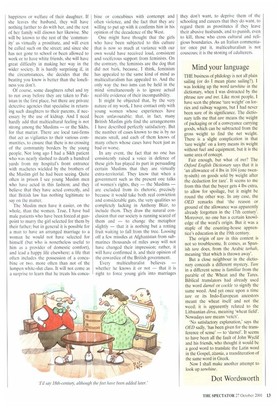Mind your language
THE business of philology is not all plain sailing (or do I mean plane sailing?). I was looking up the word tarwhine in the dictionary, when I was distracted by the phrase tare and fret. Like most people, I have seen the phrase 'tare weight' on lorries and railway wagons, but I had never been sure of its significance. The dictionary tells me that tare means the weight of packaging or of a conveyance carrying goods, which can be subtracted from the gross weight to find the net weight. There is a slight complication in that 'tare weight' on a lorry means its weight without fuel and equipment, but it is the same area of concept.
Fair enough, but what of tret? The Oxford English Dictionary says that it is 'an allowance of 4 lbs in 104 (one twenty-sixth) on goods sold by weight after the deduction for tare'. It seems to me from this that the buyer gets 4 lbs extra, to allow for spoilage, but it might be round the other way. In any case, the OED remarks that 'the reason or ground of the allowance was apparently already forgotten in the 17th century'. Moreover, no one has a certain knowledge of the word's origin. But it was a staple of the counting-house apprentice's education in the 19th century.
The origin of tare in this context is not so troublesome. It comes, as Spanish tara does, from the Arabic tarhah, meaning 'that which is thrown away'.
But a close neighbour in the dictionary conceals a different mystery. Tare in a different sense is familiar from the parable of the Wheat and the Tares. Biblical translators had already used the word dame! or cockle to signify the same weed. And yet once upon a time tare or its Indo-European ancestors meant the wheat itself and not the weed; it is apparently related to the Lithuanian dirva, meaning 'wheat field'. Nowadays tare means 'vetch'.
'No satisfactory explanation,' says the OED sadly, 'has been given for the transference of sense' — to 'darnel'. It seems to have been all the fault of John Wyclif and his friends, who thought it would be a good word to translate the Latin word in the Gospel, zizania, a transliteration of the same word in Greek, Now I shall make another attempt to look up tarwhine.
Dot Wordsworth










































































 Previous page
Previous page